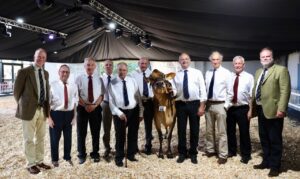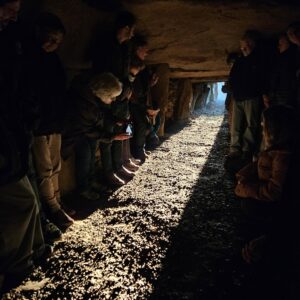
George Monbiot’s plan for a world without agriculture is misguided, says Colin Tudge
George Monbiot has a three-point plan to feed us all well and look after the wildlife and generally solve all the world’s problems — a somewhat unlikely amalgam of veganism, re-wilding, and high tech, producing ersatz meat from microbes raised in “compact cruelty-free factories that don’t pollute”. We need to break away from the vision which, he told us in The Guardian on May 26 (“Opinion”, page 3), is exemplified and promoted by King Charles: “tiny villages … with ruddy-cheeked farmers driving horses and carts, alpine pastures where sheep graze and people scythe the grass…”. Such farming “won’t solve the global food crisis” and the very idea of it is “infantile”.
George’s thesis evidently has wide appeal and is creating some unlikely bedfellows. Vegans like it, obviously. Some environmentalists like it because it promises to provide more wilderness. It appeals to big business because there are big bucks to be made, and high-tech food factories would tighten still further the corporates’ stranglehold on food and farming and hence on all life on Earth. And it appeals to a certain strain of politicians (the dominant strain, it seems) who see agriculture simply as “a business like any other”, and have had no serious engagement with science or technology but are attracted to high tech because it makes them seem avant garde, and seems to offer instant-off-the-shelf solutions to problems of which they have no understanding and seem out of control. But, like Kwasi and Truss’s magic economic formula, George’s post-agricultural vision is too simplistic by half and if acted upon in a big way would merely replace the present agricultural/ecological/economic crisis with another that in essence would not be very different from the one we are already embroiled in.
To be sure, veganism can be defended on moral and metaphysical grounds (do we really have a right to control kill our fellow creatures, largely for our own delectation?). But the ecological case for it, which George argues, is very dubious. Agriculture should indeed focus on crops but there is no system of farming that cannot benefit from judicious input from animals, to provide fertility and clear up leftovers and surpluses, and even (as with ducks and snails) help to control pests. Vitally, too, domestic or semi-domestic animals can also make good use of land where it’s too hot or cold or wet or dry or rocky or steep for horticulture or arable, just as they always have. Raised in a fairly relaxed fashion as creatures of the great outdoors, the domestic breeds can become the keystone species in species-rich, otherwise wild ecosystems, plugging the ecological gaps formerly filled by wild horses, cattle, deer, and pigs (though still taking care of the wild creatures). The trouble starts only when farming is geared to money and agriculture as a whole is designed to maximize meat, which affluent societies – or at least, newly affluent societies — seem able to consume in indefinite amounts.
Re-wilding has its place (we need all the wilderness we can reasonably create) and it is of course grotesque, and indeed wicked beyond measure, to destroy tropical forest to make way for oil palms and soy beans to feed to western pigs and poultry and cattle – or indeed to import such plunder in vast quantities just to meet the demands of an apparently insatiable market. But the answer to all this is not to destroy agriculture but to cut out excessive meat consumption and to find ways of integrating farming with wildlife, and set out to create good jobs and true communities: land sharing with more agrarian societies as opposed to land sparing with food from factories and people in skyscrapers. In other words, we need to apply the principles of agroecology and food sovereignty – both of which can still be seen in traditional forms in the farming of Eastern Europe, insofar as it has survived the ravages of corporatization, both within the EU and outside it. This is the point King Charles makes with reference to Transylvania. Others say the same about Poland. We might recall too that traditional farms worldwide, whether the farmers are ruddy-cheeked or black or brown, men or women or indeed children, still feed 70 per cent of the world’s population – and those who know such farming point out that with a little more help of an economic and logistical kind, with only a few technological tweaks (like rubber tyres and vaccines), could generally be a lot more productive than they already are.
The idea of making ersatz meat from beans, fungi, or various microbes has been with us at least since World War I and re-surfaced in the 1970s when fears of overpopulation loomed large and genetic engineering was just coming on line and the Royal Society no less ran a high-profile conference on ersatz (which I attended and wrote about). The point then as now is that people don’t need much meat, and all the world’s greatest cuisines on a broad axis from Italy to China use meat sparingly (as garnish and stock), and the kind of farming we really need (nowadays called agroecology) does produce small amounts of meat – enough to meet the needs both of nutrition and of good cooking. In fact there is a perfect one-to-one relationship between good farming, sound nutrition, and the world’s finest cooking – so we just need to re-learn how to cook and to emulate the world’s great traditional cuisines. We don’t need factories for ersatz and indeed it makes no sense to extol the virtues of an all-plant diet and then try to imitate a meaty one.
On a considerable point of detail, too, it isn’t clear at least to me where the microbes in their factories are supposed to get their carbon, which of course is the core element of all organic matter. Either they must get it from oil (as BP suggested in the 1970s), which means from the remains of organisms that lived many millions of years ago, or from plants that are photosynthesizing now. To be sure, green algae that hardly qualify as bona fide plants also photosynthesize. Spirulina has been cultivated for some decades (in polythene tunnels). Bacteria invented photosynthesis and many still practice it (notably the cyanobacteria, formerly known erroneously as “blue-green algae”). But photosynthesis needs plenty of light, which is serious energy, and the easiest way to produce organic molecules in the required quantities and in acceptable form is to grow plants outdoors in the sunshine. Green leaves contain the most protein, and the idea of processing leaf protein in factories for human consumption was again mooted decades ago. But, at least for human beings, seeds are the most convenient source of plant protein – which takes us back to arable farming, and to the ingenuity of proper, traditional cooks who can turn wheat and rice and maize and millet and pulses and potatoes and coconuts into things delectable without pretending that they are what they are not (with a little help from herbs and spices of which a little goes a long way, and smidgeons of animal flesh for garnish and bones for stock).
In truth there is nothing infantile about farming that is designed to produce good food and look after the natural world and to support agreeable communities, as opposed to farming that is designed to maximize and concentrate wealth and replace human beings with machines. The only thing infantile is George’s misrepresentation of it.
More essays by Colin Tudge may be found on his website: Colin Tudge’s Great Re-Think (www.colintudge.com)




